News
For latest updates on UK Architects Declare, please also follow us on BlueSky, Instagram and LinkedIn
Our 2025 impact Report
We are pleased to share our latest Impact Report, covering our work for 2025. Our 2025 Impact Report:
- highlights AD's workstreams across the year: Advocacy, Engagement, Guidance, Education, and Paradigm Shift;
- gives an overview of our actions at a glance and how we worked to share our messages;
- shares insights into what signatories and others told us in our first annual survey;
- offers some of impact stories they shared with us.
The short document also looks ahead to our priroties for 2026 and thanks signatories and supporters for their contributions to our work, whether through their expertise and ideas, their voice or their financial support.
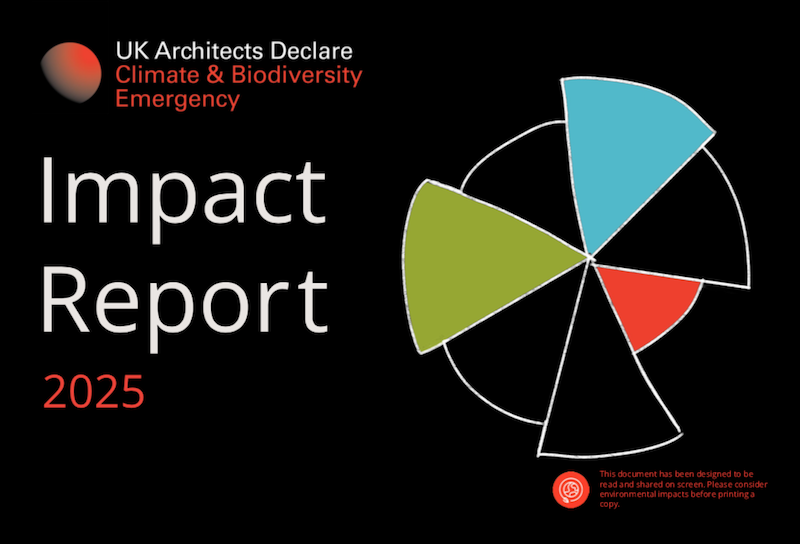
24 February 2026
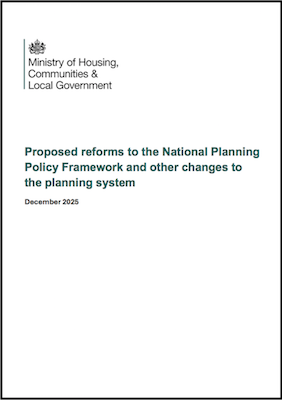
NPPF consultation: We did not declare a climate & biodiversity emergency to accept minimum standards.
Let’s not make the floor the ceiling! The draft NPPF consultation (National Planning Policy Framework) proposes changes that would rewind progress, stifle innovation, and reduce our ability to meet national carbon targets.
The consultation closes on 10th March. We urge AD signatories in England to respond and make clear that national policy must enable and not restrict climate leadership, innovation, and the ability of local authorities to go further where viable.
While there are aspects of these broad-ranging changes that are positive, we want to draw your urgent attention to section PM13 'Setting Standards'.* If adopted this would prevent England's local authorities from setting higher standards (EUI, renewable energy, and related measures). A reliance on Building Regulations, the ‘floor’, is simply the wrong mechanism to use.
Across the UK, local authorities have led the way in raising standards - driving down operational carbon, accelerating industry capability, supporting biodiversity, and providing the market the certainty needed to innovate. This progress has not happened by accident; it has been enabled by local leadership. Countless authorities have been raising the bar and, in doing so, galvanising our industry while reducing carbon and enhancing biodiversity.
At a time when the UK’s net-zero economy is growing three times faster than the overall economy, this is not the moment to retreat. It is not the moment to constrain ambition. And it is certainly not the moment to lock in mediocrity. Why put on the brakes?
* See page 24 of the document, and question 18 in the consultation.
Please get involved!
We support our friends at LETI who are rising to the challenge and ensuring we can respond to this consultation with ease. They have also organised a 45-minut webinar: 'Join LETI’s Call to Action on the NPPF Consultation' on Wednesday 25th February at 1pm. You can register here.
They have also created a template to help us respond to the consultation concentrating on PM13: Consultations | LETI
Do contact us if you would like more information or indeed would like to discuss any of this further.
23 February 2026
COP 30 - Solutions Exist, Act Now!
This year was the 30th annual UN COP climate meeting, and it has become a standard response for climate activists to bemoan the dangerous lack of progress being made each time. This year is no exception. Some clear impacts, such as an absent US delegation, and a visitor ratio of more fossil fuel lobbyists than delegates, emboldened the Petrostates to block the Ending Fossil Fuels Roadmap. This meant that fossil fuels are not mentioned in the final decision, and, despite being a rainforest conference, there was no deforestation roadmap either.
However, some positive moves forward should certainly be highlighted – the conference agreed to triple funding for climate adaption, particularly for developing countries, although this won’t come into force until 2035, leaving them to deal with the consequences of the rest of the world’s actions for another decade. Another important agreement was a plan for a Just Transition Mechanism, to ensure that the move to a green and circular economy is fair and just for all people and communities – but stopped short of attaching funding to the plan. And although a small number of states refused to agree the fossil fuels roadmaps, it is promising that 90 countries have signed up to a voluntary roadmap to end fossil fuels outside of the UN process, whereby they will work together to drive progress.

Former AD Steering Group member Duncan Baker-Brown attended the conference and gave us an account of his experience:
“As co-Chairs of RIBA Climate Emergency Group both Mina Hasman and I were given the opportunity to attend COP30 Brazil in the beautiful City of Belém. Mina attended Week 1 and I was there in Week 2. We have both attended COPs before, and they are often portrayed as a failure, which from the point of view that there appears not to be too much consensus across the United Nations193 member states, is true to a point. However, the UN's strength is also its weakness. The requirement for 193 signatories to approve every decision hides the fact that over 95% of its members would agree to de-couple from relying on fossil fuels today if there was at UN pledge to sign.
"Also - and this is one of the main motivators for me attending - there is so much good work getting done where peoples of different nations get together to share knowledge and experiences. And this is true of the construction sector that I am part of. One last point. Well done the Brazilian Government for ensuring that protestors (for the most part) were listened to and allowed to make their case and make some beautiful noise right outside the main debating chambers and often within them as well. And thank you to RIBA University of Brighton School of Architecture, Technology and Engineering and my practice BakerBrown for letting me attend.”

Steering Group member Alasdair Ben Dixon, from Collective Works, commented:
“This COP felt dramatic, the 30th edition, from the rainforest, with a fire on day 10, and bold interventions from Panama and Colombia during the final plenary. What stood out in coverage from friends and colleagues on the ground is that this COP needs to be the moment when we commit to implanting the ideas we all have. As our banner states, the Solutions exist – act now.”

The waste generated by the UK construction sector in a single year could fill the River Thames from Imperial Wharf to the Thames Barrier, so it’s crucial that we continue to put pressure on governments and legislators in the UK to push forward the transition to a circular economy and a regenerative industry. Our Building Blocks manifesto and Circular Revolution round-up suggest policy changes and a budget approach collated from an industry-wide consultation, while tools such as the Regenerative Architecture Index allow us to champion the incredible work already being done. 2026 will see us continue these threads, building on our campaigns and advocating for our collective voice to be taken on board and effect real change.
You can read more about COP30 here - from Mina Hasman and Farhana Yamin.
17 December 2025
UK Architects Declare at Futurebuild 2026
UK Architects Declare is proud to be one of 60+ industry-leading organisations, including Architecture Today, Sustainable Development Foundation, UK Green Building Council, RIBA, and ASBP - Alliance for Sustainable Building Products, supporting Futurebuild 2026. These influential organisations play an integral role in the Futurebuild Knowledge Programme, delivering 133 hours of CPD-accredited content over 3 days across two conferences and multiple seminar stages. AD is working with partners to share special events exploring regenerative practice and a circular built environment.

In a landmark move for the UK construction sector, Futurebuild and UK Construction Week London will come together from 12–14 May 2026, creating a new national platform for the built environment at Excel London. The events will bring 25,000 built environment professionals, 600+ exhibitors and 700+ speakers across 11 dedicated stages under one roof, making it the largest and most comprehensive construction event in the UK calendar.
Three days of ideas, inspiration, topical discussions and debates on:
- Improving design & safety
- Tackling rising costs
- Meeting ambitious sustainability goals
Full details of our events and the full Futurebuild programme coming soon. In the meantime, find out more and register here for your free place.
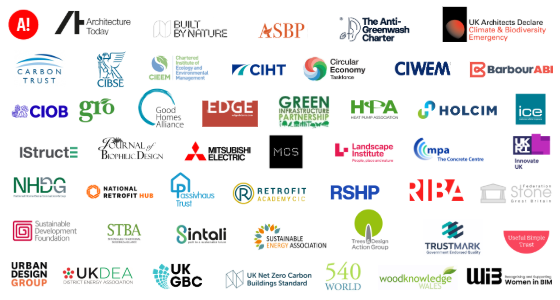
16 December 2025
Architects Declare shares industry's pledges and government asks from A Circular Revolution
Six weeks ago UK Architects Declare held an event which was hailed by the industry as a watershed moment for the Circular Economy. As reported at the time, more than 400 industry leaders took part in a symbolic flight of the London Eye, followed by a showstopping event with keynote speaker Paul Ekins from the government’s circular economy taskforce.
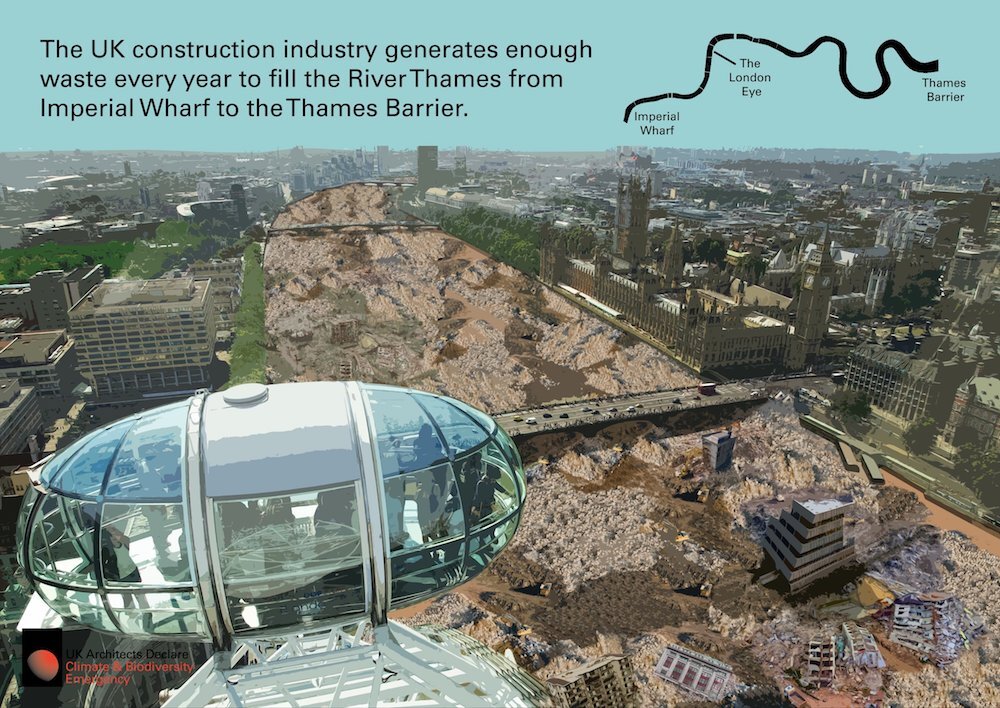
During their 25 minutes in the pods, participants brainstormed and discussed how both they and their business could most effectively contribute to driving the systems change we need. We asked participants to make a Pledge and offer an Ask – a realistic pledge with a positive step forward that they can make happen, and an Ask of government.
Five strong areas of consensus that emerged across all our pod discussions in relation to the industry's Asks of government were; Financial & Tax Incentives / Legislation & Regulation / Data & Accountability / Education & Skills / Market development & infrastructure. Participants also made over a hundred pledges for their own actions for a circular built environment.
We are now excited to publish the results of this collective thinking in our event round-up - alongside our original Call to Action. Both documents are published in the Changing the Goals of the System section of our Resources page.

We thank our sponsors for their generous donations: Lazari, Mace, Marks Barfield Architects, and Structure Tone. We also thank Sustainable Ventures for their support.
26 November 2025
Architects Declare seeks new Next Generation Ambassadors to help shape our work
We’re building on our commitment to help shape and deliver meaningful change within the built environment sector by including the next generation of professionals in our thinking and planning for AD's next phase of work. Candidates - whether studying, on placement or in practice - for our Next-Gen Ambassadors will work alongside professionals at senior levels in a range of organisations by joining members of our Steering Group to:
- Help shape the direction of a charity working to shape the future of our built environment;
- Develop our thinking on topics relevant to your studies / current work and future career;
- Help us build the capacity of new and future architects through our programme;
- Gain new insights and knowledge at the forefront of regenerative design and other priorities for our sector.
This volunteer role (up to 12 months) builds on the work of our first Student Amabassadors, 2024-25. It will appeal to current Part One students and up to recent graduates up 2 years post-Part Two with
- Passion for sustainability, regenerative design and helping new architects become future leaders in tackling the climate and biodiversity crisis.
- Drive, self-motivation, ability to create and deliver their own work, curiosity and a willingness to deepen their knowledge.
- Ability to bring their learning and ideas to our discussions.
For more details of the role and how to apply, see our Next-Gen Ambassador Role Description. Deadline for applications: 7th January.
25 November 2025
Regenerative Architecture Index 2025 - Results Launch
On 2nd October, Architecture Today and UK Architects Declare launched the results of our second annual Regenerative Architecture Index. Launched in 2024, the RAI benchmarks regenerative policies, actions and working practices, to share best practice, celebrate success, raise awareness across the wider sector and act as a catalyst for regenerative practice across the industry.
With around 150 people gathered at Broadway Malyan's venue, we were thrilled to spend our second year in the company of so many progressive and inspiring practices, exploring oportunities and examples of system change within the built environment.
Following introductions from RAI partner Schüco UK Limited and our hosts Broadway Malyan, we were treated to insights from our guest speaker, renowned neuroscientist and entrepreneur Beau Lotto. He explored ideas for regenerative design and the future resilience of our built environment. Beau also announced he is looking for a team to help him translate this way of working into a new education hub in Somerset - and will be using this year's RAI to help identify this team.
Architecture Today's editor Isabel Allen announced this year's front runners in each RAI category: Being a good ancestor; Co-evolving with nature; Creating a just space for people. 116 practices entered this year, up from 68 in 2024, an encouraging sign that the industry is responsive and positive about this collective move towards regenerative design, and working collaboratively to pave the way.
Following the results, Lawrence Bates from The Wildheart Trust - who spoke at the 2024 RAI results launch - announced the shortlist, drawn exclusively from last year's entrants, for design of the Trust's new International School of Rewilding and Regenerative Agriculture on the Isle of Wight. Congratulations to BakerBrown Studio, Marks Barfield Architects and Unknown Works for making the shortlist.
And then it was on to the party, where 5 different DJs helped us to celebrate for the rest of the evening…
You can read Architecture Today's summary here, with details in their special RAI 2025 edition of Architecture Today.
And there is more learning from the RAI and further regenerative insights and discussions at RegenerativeArchitecture.org, the new online community from Architecture Today and Architects Declare. Do check that out and take part!
Thanks to Architecture Today, Schüco UK, Broadway Malyan and all our RAI entrants for making this event and our second Regenerative Architecture Index such a success.
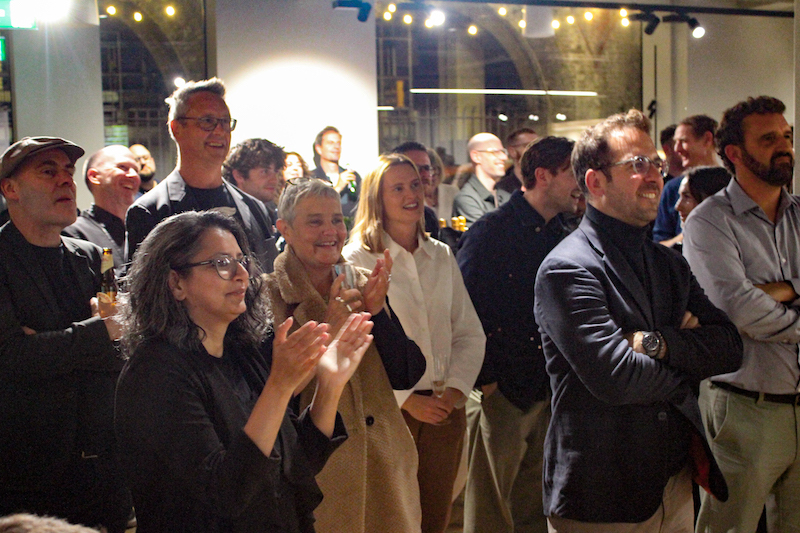
31 October 2025
AD's ‘Circular Revolution’: Watershed event calls for built environment Circular Economy
On Tuesday 14th October 2025, more than 400 key industry leaders, policymakers and innovators gathered for UK Architects Declare’s ‘Circular Revolution’ event, marking a watershed industry call for a move to a Circular Economy in the built environment and beyond.
We took over all 32 pods of the London Eye, with the best and brightest representing the built environment from a wide range of areas - from contractors to acousticians, architects to real estate, engineers to energy consultants. As well as our 4 lead sponsors, 18 organisations booked a pod specifically to engage their invited guests in the transition to a circular economy. We made a symbolic rotation, we brainstormed, we challenged, and we documented, with each pod assigned an AD facilitator to discuss circularity themes and to gather feedback into industry pledges and government asks, before we amassed at Sustainable Ventures for rousing speeches to kickstart the circular revolution…
The waste generated by the UK construction sector in a single year could fill the River Thames from Imperial Wharf to the Thames Barrier! Whilst some of this is recovered, much of it leaves the construction sector, devalued, downcycled and flowing into other sectors, often sent overseas. This leaves the UK construction sector bringing in more and more virgin materials, contributing to increasing carbon emissions and ecological degradation.
We’d like to thank our sponsors for their generous donations: Lazari, Mace, Marks Barfield Architects, and Structure Tone. We would also like to thank Sustainable Ventures for their support in making the evening such a great success.
We had keynote talks from leading voices in the field, highlighting the pivotal actions we need to take to unite industry leaders and demonstrate to government and policy-makers that the built environment sector is ready to lead the transition to a circular economy.
Prof Paul Ekins OBE, Deputy Chair of the Government’s Circular Economy Taskforce
"What examples of best practice? That's going to be really really really important, because above all what our civil servants want to know is does this stuff work, is it going to actually do what it says on the tin in terms of both the economics and the environment..."
Joanna Dimitriadis, Engineering Lead at Skanska
"The Circular Revolution event sent a strong message that the UK construction industry wants to embed circularity in the built environment - and that achieving success requires the collective support of clients, consultants, contractors, and policymakers!"
Julia Barfield, co-designer of the London Eye and champion of sustainable design
“We are excited to have brought together so many of the leading voices -225 organisations, 450 individuals - across the built environment:- developers, politicians, contractors, consultants, think tanks, activists, voluntary groups and deconstruction contractors, as well as members of the government’s Circular Economy Task Force. Conversations of top down and bottom ideas of how we can realise the Circular Revolution abounded. Next step – make our Call to Action a reality!!”
Duncan Baker-Brown ARB RIBA, architect, author, and circular economy pioneer “The UK construction sector is primed to do the right thing because we have the collective knowledge to design out waste and to turn those long-established linear systems into closed looped circular systems. And with DEFRA’s forthcoming Circular Economy Strategy for England we will have the legislation required to enable us to develop an authentic low carbon built environment sooner rather than later.”
We identified that to shift course, we need both top-down policy interventions and bottom-up industry innovation. The evening was both a celebration and a call to action: a chance to unite industry leaders, inspire systemic change, and demonstrate to the government that the sector is ready to lead the shift to a circular economy.
Things are in motion, and we will ensure we keep up the momentum - we will be sharing lots of detail about the next steps in this campaign, the data we collected and our work with the Circular Economy Taskforce. In the meantime you can read our Call to Action.
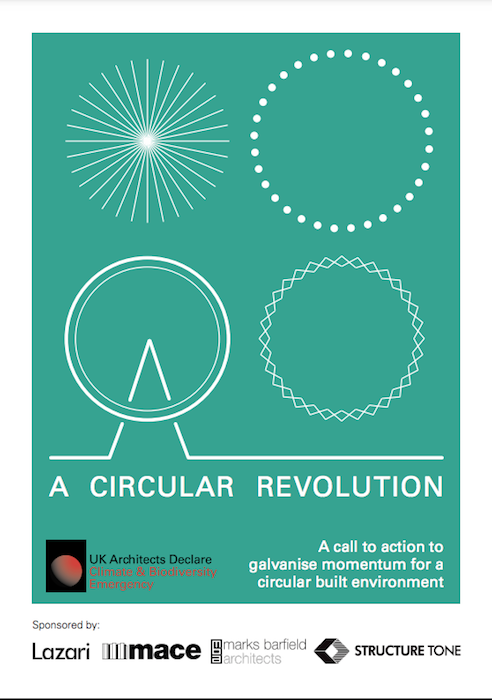
A proportion of the funds raised at our event will be reinvested into industry initiatives that accelerate this transformation.
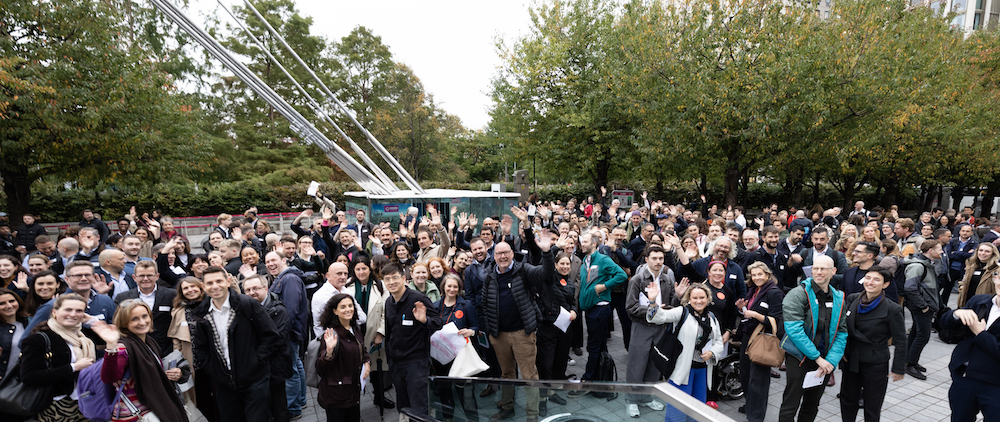
28 October 2025
: Launches
UK Architects Declare Statement on the Ongoing Destruction in Gaza
The Steering Group of UK Architects Declare issues the following statement in tandem with Australian Architects Declare.
We begin with a sincere apology for not speaking out sooner. We recognise that the situation in Gaza is part of a long and historical conflict, one that many have been cautious to address publicly because of its deeply divisive nature. However, there is a point at which silence is unconscionable. We believe that point has been reached with the deliberate starvation of children and the scale of human suffering now unfolding.
As architects, we are committed to addressing the interconnected crises of climate change, biodiversity loss, and social injustice. We cannot remain silent in the face of the ongoing, deliberate destruction of life, land, and cultural infrastructure in Gaza.
Prolonged conflicts accelerate environmental degradation, disrupt climate resilience, and destroy vital infrastructure, compounding the vulnerability of people and ecosystems. Global research shows such crises cause deforestation, toxic pollution, destruction of water systems, and the loss of buildings and cultural heritage that take generations to create and decades to restore. In Gaza, this destruction has reached an unprecedented scale, with tens of thousands of buildings reduced to rubble and essential infrastructure, including hospitals, schools, and water systems, obliterated. The environmental toll is severe: soil pollution, sewage failures, and groundwater contamination are compounded by untreated sewage released daily into the Mediterranean. Farms and tree cover have been decimated, disrupting local ecology and food systems. The humanitarian impact is equally grave, with famine conditions emerging, child malnutrition soaring, disease outbreaks spreading, and aid efforts obstructed by restricted access and fractured delivery systems
We join others in the built environment professions, including the Architects Climate Action Network (ACAN), the International Union of Architects (UIA) calls for ceasefire, and signatories of the Architects for Gaza campaign, in recognising that the scale of loss in Gaza constitutes not only a humanitarian crisis but also an ecological and cultural catastrophe. The deliberate targeting of urban infrastructure and the mass displacement of people undermine the very foundations of just and regenerative futures.
As a network committed to climate and biodiversity action, we recognise that our responsibility extends beyond national borders. We stand in solidarity with civilians and practitioners who have lost homes, studios, schools, and entire neighbourhoods. We affirm the dignity of all life and call for the protection of civilians, adherence to international humanitarian law, and urgent steps toward a lasting ceasefire, and the return of all hostages and displaced civilians to their lands in peace and security.
As a steering group, we do not claim to speak for all signatory practices, but in line with our 12th declaration point we are calling on architects to ‘Support those who are working for climate justice and strive to ensure equity and an improved quality of life for all’. We therefore encourage our community to:
Support humanitarian organisations working on the ground in Palestine, such as Medical Aid for Palestinians and the Palestinian Red Crescent.
Amplify voices of affected professionals and dedicated networks, including Architects for Gaza, the Palestine Regeneration Team and the Gaza Global University.
Contact your MP and demand action, e.g. through UNA-UK Gaza crisis: Write to your MP.
Advocate for peace, environmental justice, and reparative rebuilding rooted in ecological and cultural restoration.
Be cognizant of the work we do as architects in many countries, not just in the UK, and the unintended local impacts of this. There are many conflicts and humanitarian and ecological crises around the world and the ongoing destruction in Gaza should bring home to us all the need for justice in all we do.
We encourage dialogue within the built environment sector around appropriate practical and advocacy responses to the crisis in Gaza. The UK AD Steering Group welcomes opportunities for such dialogue.
Architecture is a profession of care. Let us not look away.
The UK Architects Declare Steering Group: Alasdair Ben Dixon, Anna Pamphilon, Anna Woodeson, Carrie Behar, Chloe van Grieken, Craig Robertson, Deepthi Ravi, Julia Barfield, Kevin Logan, Laura Baron, Mandy Franz, Tom Gibson, Tom Greenall, Zoe Watson
19 August 2025
AD supports new Circular Economy Policy from ACAN!
We're excited to have worked with our friends at Architects Climate Action Network (ACAN) on the first phase of their Circular Economy Policy Campaign 2025 - comprehensive policy recommendations that have now been submitted to the UK Government Taskforce.
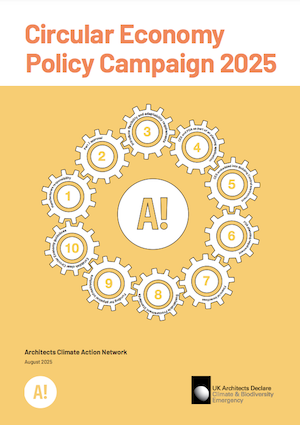
With ACAN, AD believes that embedding circularity in construction is crucial for reducing carbon emissions and our overall climate impact. While existing planning regulations have been a valuable step, we urgently need clear, ambitious local and national regulations to accelerate this transition.
The campaign is in line with AD's own Building Blocks manifesto to transform our built environment, which we launched last year and are continuing with new work, to share soon!
You can find the full Circular Economy Policy Campaign here, including the list of signatories to date - and you can add your support.
11 August 2025